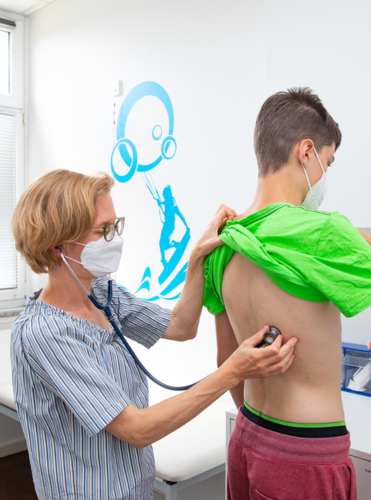Fifteen-year-old Torben N. pulls up his T-shirt, so that Professor Dr. Anna-Maria Dittrich can listen to his lung. „There is no more secretion“, the pulmonologist confirms with satisfaction. The young patient reports that he no longer has a cough and generally feels well. A triple therapy has clearly improved the symptoms of his mucoviscidosis. The effect of the new medication combination has also been proven in a study performed by the German Center for Lung Research and the Charité Berlin. Scientists at the MHH Pediatric Clinic were also involved in this study. „This therapy signifies huge progress for many patients with mucoviscidosis. It will possibly increase their life expectancy by decades“, says Professor Dittrich, Senior Physician at the Clinic for Pediatric Pneumology, Allergology and Neonatology and one of the authors of the study. Some of the results from the study have already been published in high-ranking journals.
Already in infancy, Torben was diagnosed as having mucoviscidosis
This condition, also known as cystic fibrosis (CF), is one of the most frequent inherited metabolic diseases of the CFTR gene. This serves as a blueprint for a transport channel of salt and water to the surface of many somatic cells. If the CFTR gene is defective, the transport channel cannot function. Viscous mucus is thus formed in the body, which can block various organs and affect their function. This is the case, for example, in the lung, the pancreas and the intestine. Due to the large amount of mucus in the respiratory tract, those suffering from mucoviscidosis can quickly be infected with germs. This can lead to life-threatening pneumonia.
Many more than 1,000 mutations of the CFTR gene are known. Eighty-five to 90 percent of all patients with mucoviscidosis carry one and the same mutation, called F508del. The new medication, which can be prescribed in Germany since August 2020, can attach itself to it. It is made up of a triple combination of so-called „CFTR modulators“. These are small molecules, which improve the function of the transport channel and contribute to a lower amount of mucus being produced.
"I can breathe more easily"
The study of this new medication also started at the MHH in August 2020, with 107 patients at four different centres in Germany taking part. At the MHH, mainly young people over the age of 12 years were included. „In our work, we were able to prove that the function of the transport channel rises from nil to 40-50 percent due to the therapy“, Professor Dittrich explains. „The effects of treatment are excellent, the participants‘ lung function is significantly better and the effects of MRI scans show that much less secretion gets stuck in their lung tissue.“ This is also the case with Torben N. Every day he takes three tablets of the new medication called Kaftrio/Kalydeco in addition to his usual therapy. His airways have thus become more resistant. „I can breathe more easily, have fewer infections and consequently also fewer days off from school“, says Torben.
The CFTR modulators ensure a milder course of illness. „That leads us to believe that the life expectancy of those affected will also significantly increase“, says Professor Dittrich. The average life expectancy for those suffering from cystic fibrosis is currently 52 years. Now it may be possible that this could be increased. The Professor and her colleagues will continue to study the effect of CFTR modulators and the disease progression in patients in long-term studies.
Text: MHH
Foto: Karin Kaiser/ MHH

15-year-old Torben N. pushes up his t-shirt so that Professor Dr. Anna-Maria Dittrich can auscultate his lungs